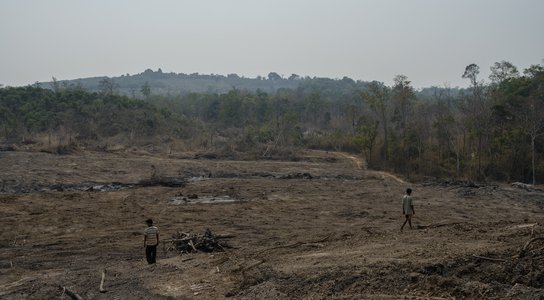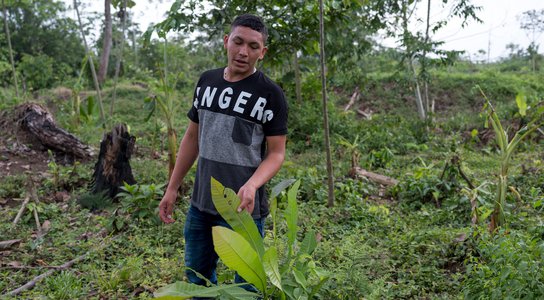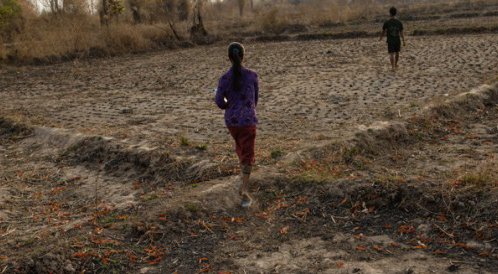This week the European Parliament's Committee on Economic and Monetary Affairs seeks to strengthen the need for EU investors to take into account key human rights risks as part of their due diligence processes – with a global human rights group stating that the Parliament must follow the lead of the its Rapporteurs to make real change happen.
- Human rights defenders – including
María Luzmila Bermeo Chuinda from Peru who has been attacked for protecting her
land – will today address the European Parliament, urging for strong EU action
to prevent human rights abuses.
- With recent stats showing that 90% of
European citizens care deeply about environmental destruction, political
momentum on ethical finance has grown more than ever in 2018.
Wednesday 21st November 2018 – Anti-corruption and human rights NGO Global Witness has welcomed new moves from the European Parliament’s lead rapporteurs to increase ethical investing, and ensure EU investors safeguard human rights as part of their due diligence processes.
In a detailed report published today as part of the EU’s Sustainable Finance Action Plan, the lead rapporteurs amended and strengthen the European Commission’s proposal for a Regulation for a framework to facilitate sustainable investment, the so-called Taxonomy Regulation.
The Taxonomy Regulation will lay the foundation for an EU framework to place Environmental, Social and Governance (ESG) risks and factors at the heart of the financial system. It aims to ensure capital flows into more ethical companies and projects throughout the EU. It was drafted by MEP Bas Eickhout (Greens) and MEP Sirpa Pietikainen (European People’s Party – EPP) – demonstrating strong cross party intentions to strengthen the human rights safeguards in the final Regulation.
Global Witness welcomed the inclusion of current international standards within this draft proposal, including the UN Guiding Principles on Business and Human Rights, , the UN Declaration on the Rights of Indigenous Peoples(UNDRIP) and the OECD the OECD Due Diligence Guidance for Responsible Business Conduct.
The regulation arrives as MEPs and other Brussels stakeholders attend an event tonight hosted by Global Witness in the European Parliament - and hear directly from front-line environmental defender María Luzmila Bermeo Chuinda - whose violent story represents the human face of unsustainable finance.
At this event to mark Global Witness’ one-year anniversary in Brussels, Maria will share personal stories of environmental and social damage, personal threats and murder linked to the actions of EU investors and their clients. There will be a discussion on how EU mandatory due diligence could stop this trail of destruction.
Momentum is building for the EU financial sector to become more sustainable following the Tang report which was voted through two weeks ago and backs mandatory due diligence for EU investors, and their overseas subsidiaries, to identify, mitigate and publicly report on environmental, social and governance risks in their investment chains.
Maria Luzmila Bermeo Chuinda, Peruvian Human Rights Defender said:
“[In my area] the oil company moved in without consultation with the people, only with the agreement of a few. Afterwards, the local community complained, when they saw the water was polluted...they did not want to use it.
“I went to meet the Pope to speak to him on behalf of Awajun people. There were representatives of eight Amazonian tribes. The other towns have more animals, more fish than us. But everyone spoke of the same problem, the problems are the same for everyone: deforestation, mining and oil.”
Rachel Owens, Head of EU Advocacy at Global Witness said:
“We need to ensure human rights are at the heart of the political debate on sustainable finance if we are to save forests from destruction and stop people having to migrate to survive or be kicked off their land for oil or mining. Europe should continue to take global leadership on sustainable finance, and this starts by making sure European investors drive progress, not destruction. 90% of European citizens care deeply about environmental protection. It’s time to listen to voters.
“As the political energy to create more ethical financial system increases, it’s encouraging that the European Parliament is making moves to ensure that any EU investor is not inadvertently or otherwise causing human rights abuses when it bankrolls a project. The Taxonomy draft Report adds to the Commission proposal, which is essential[1] if the financial industry is to contribute to a more sustainable planet.”
Richard Gardiner, EU campaigner at Global Witness
“It’s vital that progress does not stop or slow down today. The European Parliament must focus on ensuring that European investments take into account a broad range of international safeguards to guarantee that they are sustainable and ethical. This must be done by including robust due diligence processes if it truly wants to be a global leader on protecting human rights, and ensuring that financial institutions work for people and planet.”
This draft report builds on the key policy recommendations of the recent briefing, released by Global Witness, which shows that European’s money – and EU-based investors – regularly play a key role in funding projects linked to human rights abuses, land grabs and large-scale environmental destruction.
A Global Witness report earlier this year documented the murder of over 200 land and environmental defenders in 2017 – indigenous leaders, community activists and environmentalists trying to protect their homes and communities from agribusiness, mining and other global investors.
/ ENDS
Contacts
-
Rachel Owens
Head of EU Office and EU Advocacy / Directrice du Bureau (UE). Campaign Lead on Corporate Accountability
Notes to editor:
Global Witness position on EU sustainable finance regulation
In order for the EU to ensure its investors are not complicit in financing environmental damage, human rights abuse and corruption, and to tackle the social and environmental harm caused by the financial sector to land and environmental defenders, the European Parliament and Council should take the following steps:
- Introduce mandatory due
diligence for all EU investors, and their subsidiaries, to ensure that they
identify and mitigate all environmental, social and governance (ESG) risks, and
report with full transparency.
- Broaden the definition of
sustainability risk to ensure it covers not only risks to investors but also
societies and ecosystems.
- Establish a non-exhaustive
list of potential ESG risks that investors should mitigate against immediately,
as part of their due diligence processes, ahead of the introduction of a full,
overarching and mandatory EU due diligence framework
- Ensure not only asset managers but all institutional investors, including
banks and insurers, are covered by these EU regulations.
- Read Global Witness full
recommendations on the EU’s
Action Plan on Financing Sustainable Growth, Due Diligence and DSR
regulation in our briefing here.
Taxonomy report: The Taxonomy report strengthens the original proposal by:
- Broadening the scope of the Minimum
Safeguards that must be adhered to for economic activity to be considered
sustainable beyond just the ILO labour standards to also include the International
Bill of Human Rights, the EU Charter of Fundamental Rights, the UN Declaration
on the Rights of Indigenous Peoples(UNDRIP), the UN Convention Concerning the
Protection of the World Cultural and Natural Heritage, the UN Guiding
Principles on Business and Human Rights, the OECD Guidelines on Multinational
Enterprises, the OECD Due Diligence Guidance for Responsible Business Conduct
(2018, the UN Sendai Framework for Disaster Risk Reduction 2015-2030, and
Convention on Biological Diversity (CBD).
- Introduces Due Diligence procedures to
ensure economic activities identify, prevent, mitigate and account for how they
address their potential and actual negative impacts on human rights, including
the human rights of workers, in the context of the undertaking’s economic
activity, supply chains and business relationships
- This
report also builds on the recent vote by the European Parliament on rules for
‘Disclosures relating to sustainable investments and sustainability risks’,
where MEPs overwhelmingly to adopt a stronger due diligence regime (based on
the OECD on Due Diligence for Institutional Investors[1]),
and a more robust framework to define sustainability risks when it comes to
investments. The cross party support in this final vote demonstrated the EU’s
commitment to sustainable investment and Parliament’s unified position.
- Interview opportunities are available with Rachel Owens, Head of
EU Advocacy at Global Witness and Richard Gardiner EU campaigner.
- For more information or interviews please contact Rachel Owens [+32487805069;
[email protected]] or Richard Gardiner [+32
486 44 08061; [email protected]].
- Resources
- The Briefing ‘Indecent
Exposure: How EU based investors and their subsidiaries are helping to bankroll
human rights violations and environmental destruction’ can be downloaded here (PDF).
- The Global Witness Briefing ‘EU
Investor Due Diligence: Ensuring finance works for people and planet’ from October 2018 can be downloaded here (PDF).
- More information on the 2017 report on attacks on Land and
Environmental defenders: ‘At What Cost?’ released in July 2018 can be found here.
- An
indicative timeline of EU Parliamentary activity on sustainable finance can be
seen below
- 23
May 2018: Legislative proposal published – Disclosure on Sustainability Risks
Regulation
- 5
November 2018: ECON vote on Disclosure Regulation. Followed by potential
trialogues with the Council
- TBC: Rapporteur MEP Eickhout publishes draft report on Taxonomy
Regulation.
- 26
November: Council discuss the Sustainable Finance Package.
[1] https://mneguidelines.oecd.org/RBC-for-Institutional-Investors.pdf
You might also like
-
Briefing Indecent Exposure
How EU investors and their subsidiaries are helping to bankroll human rights abuses and environmental destruction
-
Campaign Hub 2017 Defenders Annual Report
'At What Cost?' looks at irresponsible business and the murder of land and environmental defenders in 2017.
-
Press release Regulating risk: Why a sustainable Europe begins with clean investments.
A sustainable Europe begins with clean investments.